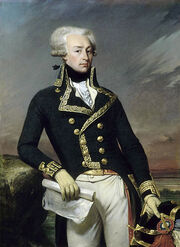| ||||||||||||||||||||||||||||||||||||||||||
Marie-Joseph Paul Yves Roch Gilbert du Motier, formerly Marquis de Lafayette (or la Fayette) (6 September 1757 – 20 May 1834) was a French military officer born in the Haute-Loire. Lafayette was a general in the American Revolutionary War and a leader of the Garde Nationale during the French Revolution.
After the rise of Napoleon Bonaparte, Lafayette continued to participate in French politics until his death. He returned to the United States for a widely publicized tour in 1824.
Marquis de La Fayette in Southern Victory
Prior to the Great War, the Lafayette Hotel, located in Philadelphia, United States and named for the Marquis de Lafayette, was rechristened the Hindenburg Hotel after the Field Marshal of Germany, the USA's most important ally.[1]
Marquis de La Fayette in Atlantis
Marie-Joseph Paul Yves Roch Gilbert du Motier, the Marquis de La Fayette was a French general in the Atlantean War of Independence.
In 1777 the officer led the French expeditionary force up the east coast of French Atlantis after disembarking at Cosquer. He had a genuine enthusiasm for the Atlantean cause; upon meeting Victor Radcliff for the first time, the marquis declared the Atlantean Proclamation of Liberty to be a document of top importance.[2]
Initially the Marquis was frustrated with the Atlantean style of war the British regulars were employing against the French, and complained to Radcliff, who had just prevented General Charles Cornwallis from attacking Hanover at Redwood Hill, via letter.[3] Radcliff said he would find someone of "suitable rank" to assist the French,[4] which the French officer interpreted as someone of the "right rank" and assumed that meant Radcliff himself would come.[5] Blaise Black reminded Radcliff that the Army of the Atlantean Assembly didn't always need his presence to stay in the fight, and the two of them set off for Cosquer to participate in the French campaign.[6] Radcliff learned a thing or two about fine food, fine brandy, and fine mistresses,[7] and in turn La Fayette learned about the proper way of dealing with the Atlantean style of war[8] as well as with rapists.[9]
The Marquis' aid was instrumental in Atlantis' ultimate triumph.
References
| ||||||||||||||||||||||||||||















